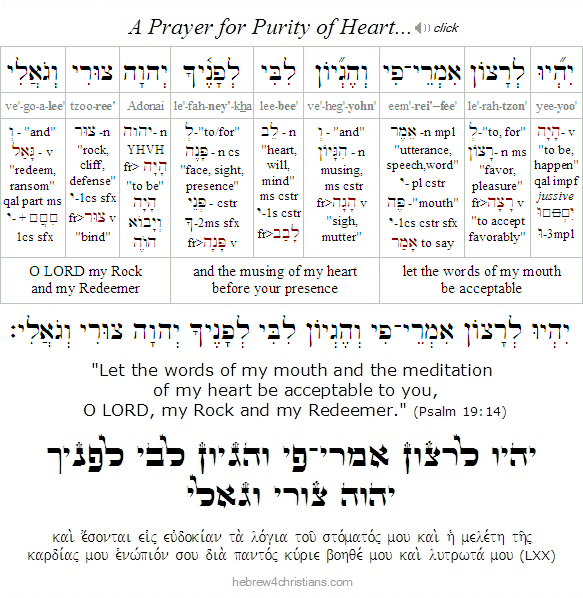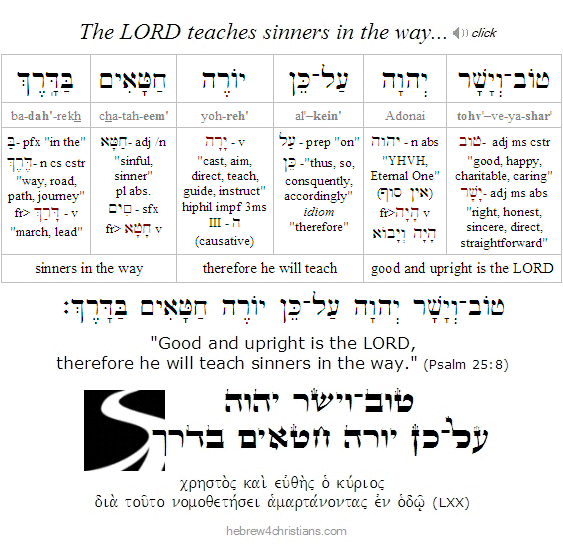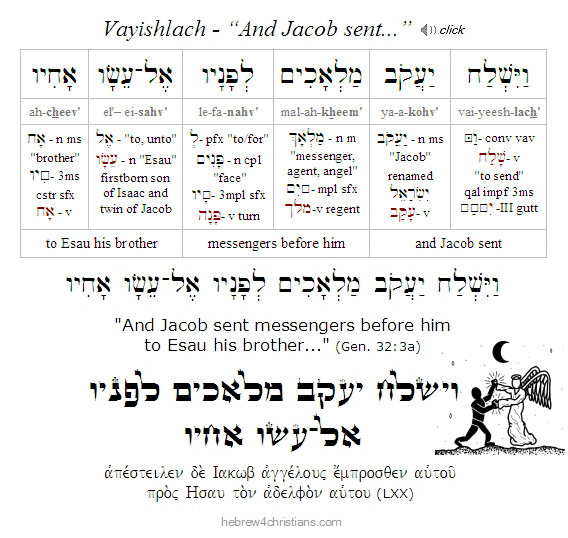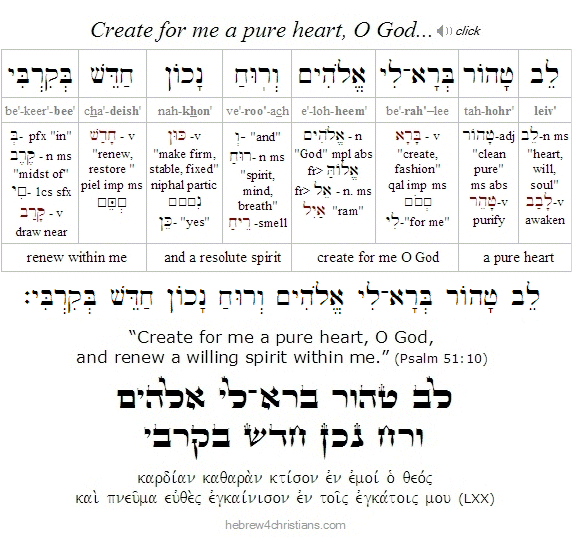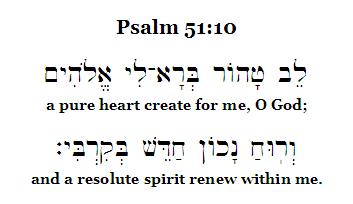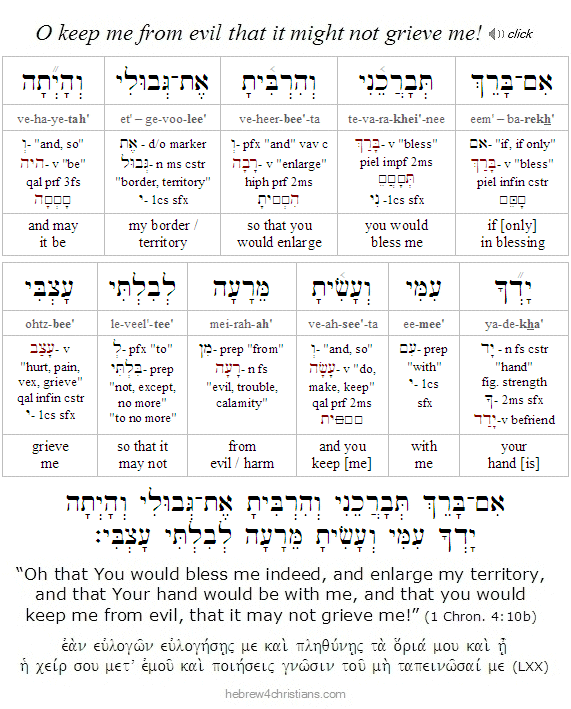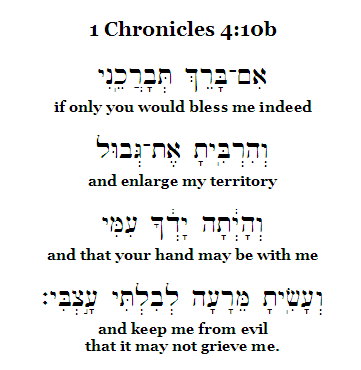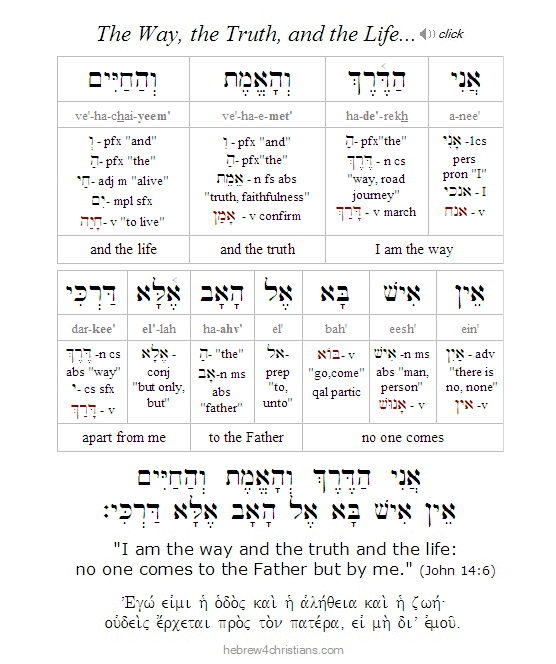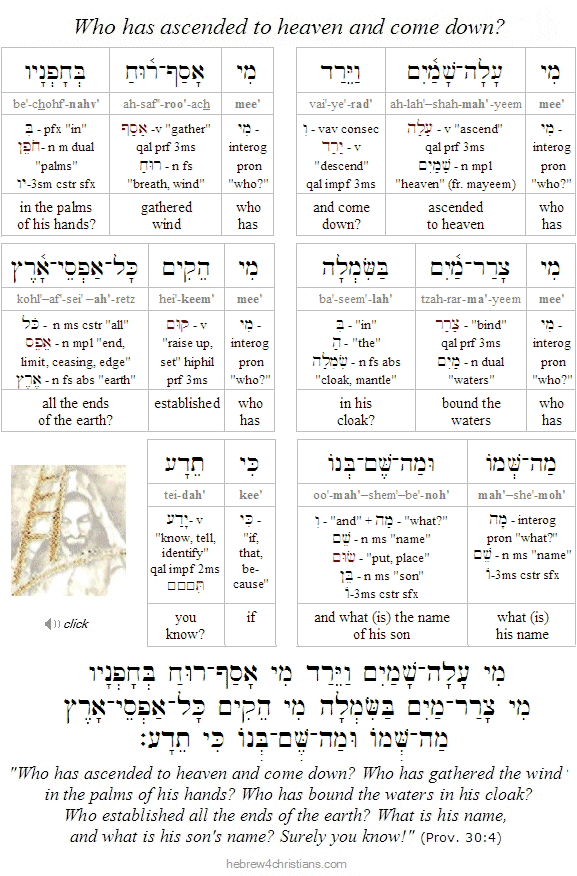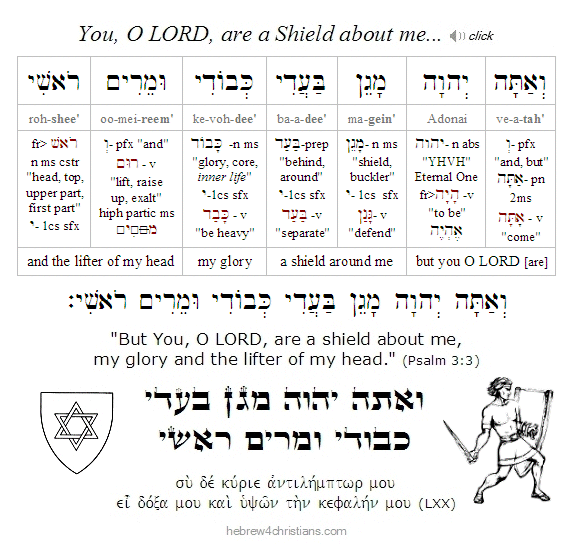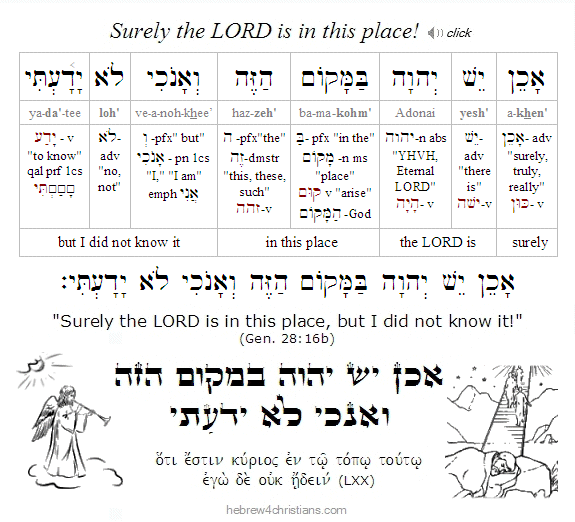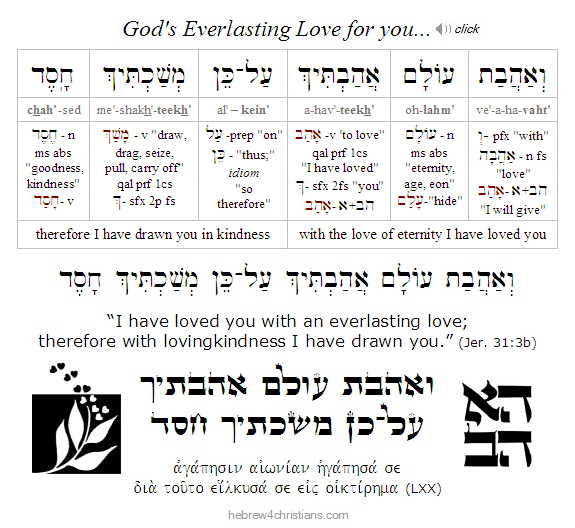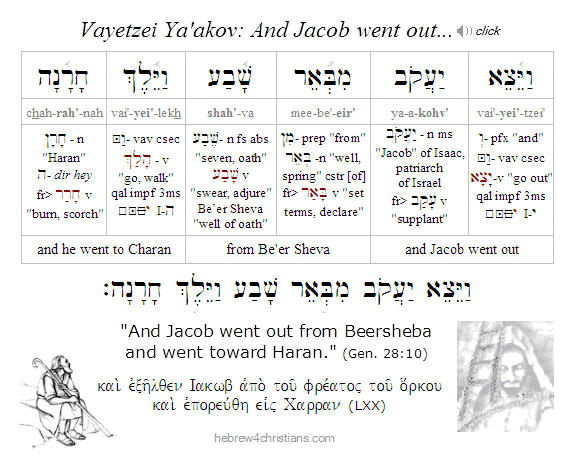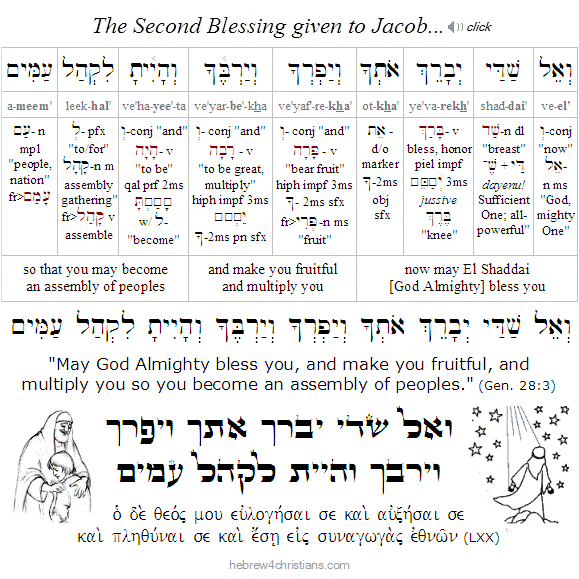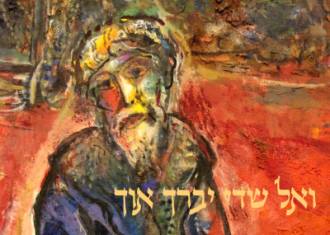|
December 2024 Updates (continued)
Note: If any page content appears to be missing, please refresh the page...
Honesty and Deliverance...

12.09.24 (Kislev 8, 5785) "Those who are well have no need of a physician, but those who are sick. I have not come to call the righteous but sinners to repentance" (Luke 5:31-32). Every one of us has a "dark side" or a "shadow self" that has destructive and selfish urges. We try to conceal this truth from others (and even ourselves) but such denial doesn't change the reality within our hearts (Matt. 5:19; Jer. 17:9; Eccl. 9:3). Indeed, when we pretend to be something we are not we are more likely to be overwhelmed by dark forces hidden within us. Paradoxically we most vulnerable when we think we are well, that is, when we deny our sickness our heart and minimize our need for deliverance.
The way of healing is to "own" or confess the truth of our inner condition and to acknowledge the dark passions that sometimes overmaster our best intentions. We must give ourselves permission to allow the hurt, angry, and fearful voices to be heard and sanctioned within us - and then to bring these dark and hidden aspects of our selves before God for healing. The failure to do so will split the soul and cause the hidden aspects of the self to seek "revenge" upon the "parent self" that censors their message. The struggle within our hearts is real and we should attend to it seriously. Denying evil by pretending that we are okay, or by blaming others, blinds us to the truth of our ongoing need for deliverance. May God help each of us to be honest with ourselves and to confess our great need before our Heavenly Father.
Why do we have such difficulty being genuinely honest with ourselves? Despite the fact that we may profess that we are "sinners saved by grace," we often make excuses for our failures, rationalizing that we are not "that bad," and therefore we postpone genuine teshuvah (repentance) and trifle with our spiritual lives. We do this because we feel an almost irresistible desire or "need" to justify ourselves, to "save face" by pretending that we are not "incurably sick," or by attempting to find something about us that makes feel valuable and worthy. As H.L. Mencken once wittingly noted, "the 'truth' that survives is simply the lie that is pleasantest to believe."
The LORD wants us to be truthful in the "inward being" (Psalm 51:6), though that truth will cost us something, namely whatever worldly gains we might find through self-deception... Opening our hearts to divine examination eventually means colliding with the world of men and their conspiracies, since the godly man no longer abides their presence (Psalm 1:1-2). The Apostle Paul said there was an exclusive disjunction between seeking the approval of men and of the approval of God: "Do I seek to please men? for if I yet pleased men, I should not be the servant of the Messiah (Gal. 1:10). Likewise we are told not to deceive ourselves (lit., "reason around" the truth, from παραλογίζομαι, from παρά, "around, beside" and λογίζομαι, "to reason") by merely hearing the truth of Scripture and not living it (James 1:22). God is not interested in "lip service" any more than he desires heartless sacrifice (Isa. 29:13; Hos. 6:6; Matt. 15:9). "Let your love be genuine (ἀνυπόκριτος, without a "mask" put on), abhor what is evil; cling to what is good (Rom. 12:9). God abhors those who pretend to know Him but who are really spiritual impostors (Matt. 7:21-23; 25:11-12; Luke 6:46).
Tragically (and paradoxically) many people can talk themselves into believing something without really believing it, and that is perhaps the most dangerous thing of all (Matt. 7:22-23). On the other hand, some people can talk themselves into believing (or accepting) something that they know is untrue (or morally wrong), and that self-deception leads to inner fragmentation, chaos, and dissolution of character. A "double-minded man is unstable in all his ways" (James 1:8). As I have said before, the word translated "double-minded" is dipsuchos (δίψυχος), a word formed from δίς, "twice" and ψυχή, "soul." The word describes the spiritual condition of having "two souls" that both want different things at once -- a state of inner contradiction and ambivalence.
Hebrew Lesson
Psalm 51:6 reading (click):
Thank the LORD our God that there is real healing for our inner dividedness, ambivalence, and double-mindedness, but that healing demands rigorous honesty. As Kierkegaard rightly observed: "No person is saved except by grace; but there is one sin that makes grace impossible, and that is dishonesty; and there is one thing God must forever and unconditionally require, and that is honesty." Therefore we are instructed to confess our faults one to another, and pray for one another, that we may be healed (James 5:16). May the LORD our God help each of us to be wholehearted in our devotion to Him.
Finally, friend, a closing thought. Do not despair by thinking that you will never change. Simply enter into the presence of God in Yeshua. That is what "self-denial" means. Turn to God and know his heart. When you do, you receive a heart to know him in return... Believe to see the goodness of the LORD in your midst. Amen.
The Grace of Torah...
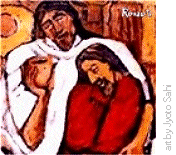
12.09.24 (Kislev 8, 5785) It's been rightly said that God doesn't have any grandchildren in heaven, only children: He is not your "heavenly grandfather" but your heavenly Father (אֲבִיכֶם בַּשָּׁמַיִם). And just as a good father disciplines his children for their own good, so does your Father in heaven (Prov. 3:11, Heb. 12:5-7). The discipline of God leads you to do teshuvah for your ultimate good (Rom. 2:4). As C.S. Lewis once remarked, God doesn't love you because you are good, but He will make you good because He loves you.
The Hebrew word derekh (דֶּרֶךְ), often translated as "way," metaphorically refers to the journey, manner, or course of your life. Because God is tov v'yashar (good and upright), he teaches his children to be yesharim (יְשָׁרִים), i.e., those who walk uprightly. Indeed, the way of the LORD (דֶּרֶךְ יהוה) is "to do acts of charity and justice" (לַעֲשׂוֹת צְדָקָה וּמִשְׁפָּט) (Gen. 18:19). This is the "straight way" (derekh ha-yashar), or the "narrow path" that leads to life (Matt. 7:14). The yesharim are known by the good fruit of their lives (Matt. 7:15-23).
Note that the verb used in this verse (יוֹרֶה) comes from the root yarah (ירה) -- the same root used in the word Torah (תּוֹרָה). Because the LORD is good and upright, He gives us Torah for our lives. God educates us for eternity by imparting to us moral and spiritual truth. As King David taught, "Happy is the man who delights in the Torah of the LORD and meditates upon it day and night" (Psalm 1:1-2).
Surely followers of Yeshua the Messiah should likewise love and study the Torah. After all, Yeshua was the Angel of the LORD (מַלְאַךְ יהוה) who spoke at Sinai when the Torah was given to Israel (Exod. 3:2, Deut. 4:12), and he is the same "yesterday, today, and forever" (Heb. 13:8). During his earthly ministry, Yeshua studied Torah and clearly taught us to keep the ways of the LORD (Luke 4:16, Matt. 7:12). He repeatedly affirmed the central teaching of the Torah – the Shema –putting the duty to love God above all else (Deut. 6:4-6; Mark 12:29). Indeed, the "New Covenant" itself promises that the Torah would be written "upon our hearts" (Jer. 31:31-33, cp. Matt. 26:28) and is inscrutable apart from it – just as Yeshua himself clearly taught (Luke 24:27; see also: Matt. 5:17, Rom. 15:4, 1 Cor. 10:11, 2 Tim. 3:14-17, etc.).
Our Lord Yeshua is called derekh ha-chayim (דֶּרֶךְ הַחַיִּים), the way of life (John 14:6). He is the Wonder of the Torah, its living expression and goal. With the psalmist, therefore, we earnestly pray: גַּל־עֵינַי וְאַבִּיטָה נִפְלָאוֹת מִתּוֹרָתֶךָ / gal einai v'abitah nifla'ot mi-Toratekha: "Uncover my eyes and I will behold wonders from your Torah" (Psalm 119:18). Amen.
Hebrew Lesson
Psalm 25:8 reading (click):
It's important to keep in mind that by the word "Torah" I am not referring to the Rabbinical traditions of post-Temple Judaism but rather to the "instruction" or "teaching" of the LORD God of Israel. As I've repeatedly explained in my writings, Torah is always a function of covenant -- as man's responsibility -- and therefore Torah has changed in light of God's different covenantal actions in history (Heb. 7:12). Followers of Yeshua abide by the "law of Messiah" (תּוֹרַת הַמָּשִׁיחַ), that is, the teaching of Yeshua the Messiah (John 14:15, Gal. 6:2, 1 John 5:2, 2 John 1:6). For more information about this subject, please see the article entitled "Olam Ha-Torah" as well as various other articles on this site.
This week's Torah:
Parashat Vayishlach...

We always read parashat Vayishlach a week or two before Chanukah when we connect the vision and ministry of Joseph with that of Yeshua, the Suffering Servant Savior of the world...
12.08.24 (Kislev 7, 5785) Our Torah portion this week (i.e., Vayishlach) contains the famous account of how Jacob "wrestled" with the Angel of the LORD (מַלְאַךְ יְהוָה) just before he encountered his estranged brother Esau. During the "grappling" session (recall the meaning of Jacob's name), the Angel injured Jacob's thigh, but Jacob refused to release his hold until he received the blessing (הַבְּרָכָה). The LORD then asked him, "What is your name (מַה־שְּׁמֶךָ)?" And he said, "Jacob" (i.e., Ya'akov: יַעֲקב). The Angel then replied, "Your name shall no longer be Ya'akov (i.e., "heel holder" [of Esau]) but Yisrael (i.e., "contender with God"), for as a prince (i.e., sar: שַׂר) you have contended (i.e., sarita: שָׂרִיתָ) with God and with men and have prevailed" (Gen. 32:28). This encounter teaches that Jacob finally received the blessing when he refused to let his past determine his spiritual identity and destiny. With God's help he overcame the pain and shame of his past through faith.
Likewise each of us must "go to Peniel" to wrestle with the Angel, just as each of us must be renamed from Ya'akov ("a supplanter") to Israel ("a prince with God"). When the Spirit of Truth asks, "What is your name," may the LORD God grant you the courage to refuse to "let go" until you receive the divine blessing of love and acceptance...
The word vayishlach (וַיִּשְׁלַח) means "and he sent" (from shalach, שׁלח, "to send"). The sages comment that like Jacob, each person of faith is a shaliach (שָׁלִיחַ), or an "emissary" sent out to bear witness to others of the reality and true blessing of God. And may the LORD God of Israel help you, friend, serve as an extension (שְׁלוּחָה) of His loving and gracious Presence to all you may encounter this day.... L'shavuah tov b'Yeshua Adoneinu, chaverim...
Hebrew Lesson
Genesis 32:3a reading (click):
The Language of Pain...
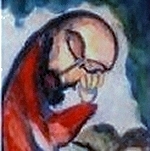
"Your place in heaven will seem to be made for you and you alone, because you were made for it -- made for it stitch by stitch as a glove is made for a hand." - C.S. Lewis
12.06.24 (Kislev 5, 5785) Regarding the "language of pain," the Talmud discusses how the bleeding of a stubbed toe corrects the relationship between man and God as if it were an "olah sacrifice" (whole burnt offering). They elaborate that this would be the case if it was the second time the toe was injured before recovering from its first injury, and that it had occurred on the right toe when the person was on a mission to perform a mitzvah.
The reference to the right toe recalls the anointing of the priest for service (Exod. 29:20) as well as the healing of a leper (Lev. 14:25). The sages note that this signification of the blood is not the result of a punitive measure but instead indicates a wound that brings the heart closer to God. In the case of an injury to the toe while doing a mitzvah, the sufferer is brought to teshuvah (repentance), not because of disobedience, but in order to learn compassion, and to affirm that everything comes only from the Lord (Psalm 136:25-26). "Let this suffering be for atonement," by which is meant, may this too bring my heart closer to God's love... The sages brought this case up as a counterexample to the notion that all suffering or pain is some form of punishment from heaven, and argue that on the contrary, some suffering is the result of God's decree. This is the message of the Book of Job as well.
A pain-free life is not necessarily a sign of blessing, of course, since it might indicate that the person is no longer being "educated for eternity," and therefore that God no longer talks to him anymore. This is one way to understand the irony of why the wicked prosper in this world, for they shall have received their reward here, but nothing in the world to come (Matt. 6:5; Job 27:8). On the other hand, pain can "goad" the soul to draw near to God for healing, which is the essential and consummate blessing, after all... Pain also teaches us to be humble, to consider our own frailty and need, and to learn compassion by extending that consciousness to people as well. The greatest example of this is found in our Savior Yeshua, who emptied himself and suffered in wholehearted service to his heavenly Father (see Isa. 50:6; Phil. 2:7-8; Heb. 2:10, 4:15; 5:8-9. 7:25, etc.).
The focus of spirituality is not about finding comfort through fulfilling our desires as much as it is devotion to the truth by exercising faith in the divine ideal. We come to God to conform to his will, not because religion is a form of therapy or another self-improvement project. Stoicism has made a come-back in the "postmodern" world, offering people a variety of philosophical diversions meant to diminish the significance of what happens in this world and to direct the mind to a "nirvana-like" equanimity (ataraxia), as if the final reconciliation has already taken place. Such detachment from the world, however, is incompatible with faith in God's omnipotence and love, since it assumes that this age is not meaningful or offers no blessing. Genuine faith in God allows us to mourn when sorrow is called for and to rejoice in times of joy; it does not negate the reality of history nor deny God's providential love in the temporal realm. This is part of the tension we have in a "two-tiered" reality, which requires us to both affirm the reality of life in this world - the mixed bag of sorrows and joys we experience in our sojourn - and the promise of the substance to come, when all tears will be wiped from our eyes and our love will be unhindered by sin... The tension is dialectical and complex: we stand in relation to God not only when we are confronted by his truth, but in our seeking and in the ordinary ups and downs of our everyday existence. As C.S. Lewis said, those who choose a life of truth over happiness often acquire both, whereas those who seek happiness over truth often acquire neither... Therefore as we walk with God, whether in the high places or in the shadow of death, we experience blessing and grace in our lives.
The temptation behind suffering is to regard it as a sign of divine rejection or abandonment. Even when suffering is interpreted to be an invitation to do teshuvah, however, it does not unambiguously indicate where we stand in relation to God... This is true even in light of the work of salvation secured in Yeshua at the cross. Is our suffering a means of correction or "chastening" (Psalm 94; 119:71)? Or is it the result of the common affliction our fallen human nature (Gen. 3:17-19; Job 5:7; 14:1; Rom. 8:20)? Or is our suffering somehow for the sake of the glory of God (John 9:1-3, Matt. 5:11-12)? The writers of the New Testament repeatedly mention fiery trials and tests that would befall God's children (1 Pet. 4:12-13; Rom. 8:17; Phil. 3:10; Matt. 5:11-12; Col. 1:24; 2 Tim. 2:12).
Some have said that this ambiguity makes teshuvah impossible, for you can't repent unless you know what you have done wrong... This raises the question of how much we are able to know of ourselves and our "secret sins," and how these affect us spiritually. "The heart is deceitful above all things, and incurably sick-- who can know it" (Jer. 17:9). The heart is the source of the problem (Mark 7:21) and yet how is it possible to overcome itself? In other words, how can a person be saved from himself, after all? If we are incurably sick, healing must come from a source outside of ourselves... by means of the miracle of regeneration.
We do not relate to God in terms of the "law" but rather in personal terms, by having faith in God's love and grace given in Yeshua (Heb. 4:15-16). The problem of our sin therefore goes beyond "forensic judgment" to that of relationship... Instead of reciting a litany of our sins against heaven, we reach out for connection, for God's mercy and touch, even if we are in darkness about what went wrong or how we lost our way. How have I broken my connection with the Lord? How have I allowed myself to harden and thereby become lost to my true heart? How have I misunderstood? How have I been blind? How have I doubted God's love for me? To "renew our days as of old" we must first understand our need for renewal - for our need to "return to our first love." We return to the Lord in trust that his love is all we need, and that he welcomes us with blessing (Luke 15:11-32).
As Kierkegaard explained, the "self" is really an inner dialog within the heart (a "relation which relates itself to itself"), that is, a self-transcendent relation that witnesses the inner dialog, though we cannot have a true "self" apart from a relationship with what Buber called an "I-Thou" connection. These two relationships are eternal - the one we have with ourselves, and the one we have with God who is the ground of our existence, and therefore we cannot really exist with ourselves apart from having a right relationship with God who establishes who we are. Paradoxically, if all we have is ourselves, we do not have a self at all, and those who seek to have a self must first lose themselves to find themselves.
God's thoughts are not our thoughts nor are our ways his ways (Isa. 55:8), and there is no "recipe" or "formula" to know Him apart from the messy business of struggling within our hearts, seeking and finding, and seeking again, lamenting and praising, and then lamenting again, by living out our evanescent lives in the depths of our needs and our dearest hopes. In times of incomprehensible suffering, a heart connection with God can indeed be quite unsettling, but we must press through the fear, we must "see through the glass darkly" and confess that "God is with us" - even in the midst of this trouble. Faith apprehends God's heart before all else - it trusts that there is unseen good that transcends and constrains the travail of the present hour. Our father Jacob was renamed "Israel" when he surrendered to God's Presence despite everything wrong he had ever done...
Hebrew Lesson
Psalm 55:8 Hebrew reading (click):
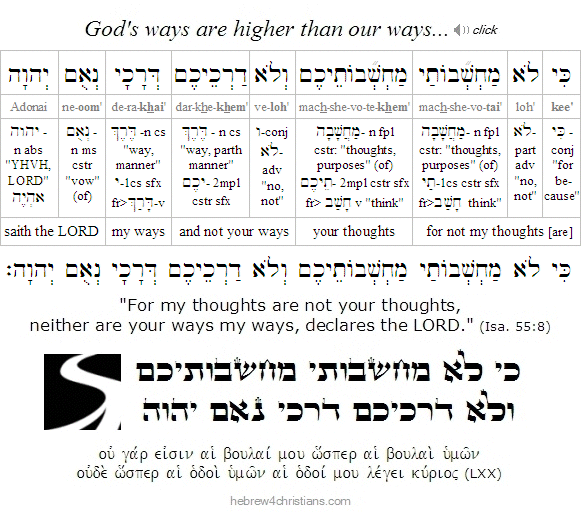 |
Faith not only affirms that God is with us in the present, however, but in the pain of our past as well. In response to the intellectual question, "Where was God in times of our sorrow, our abandonment, our nightmare?" Faith answers: "He was with us." But faith not only affirms that God was with us in the harrowing past but will be with us in the future, in the substance of our yearning for deliverance and for life. Faith "remembers the future" by holding to the promise of God, even in the wake of the past and in the ambiguity of the present...
God is involved in all our sorrows because of his greatness, and his pathos knows when "the flower fadeth and when the sparrow doth fall." As David said: "telleth our wanderings, he collects our tears and stores them in his bottle; the story is written in his book" (Psalm 56:8). The heart of the Lord spans "the breadth and length and height and depth" Messiah, a love that surpasses knowledge (Eph. 3:17-19). "It is higher than heaven-- what can you do? Deeper than Sheol -- what can you know?" (Job 11:8). Despite the sorrows and anguish we sometimes experience in this life, we trust that God will fulfill his promises to us and perfect our salvation at the appointed time. Our exile will then be over and then we will experience the consummate glories and wonders of heaven itself.
Hebrew Lesson
Job 19:25-26 Hebrew reading (click):
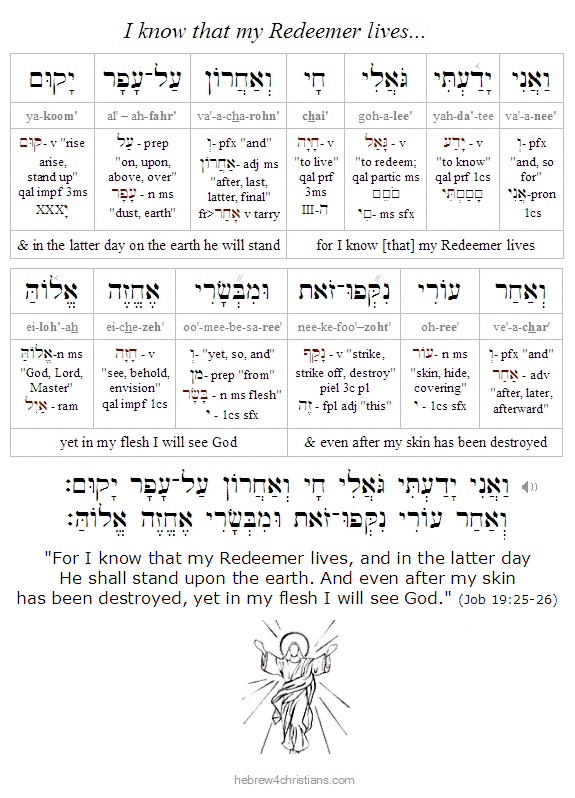 |
Why we Study Torah...
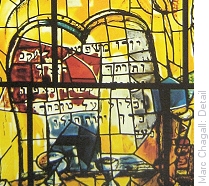
"The word of God is always most precious to the man who most lives upon it." - Spurgeon
12.06.24 (Kislev 5, 5785) Where is it written, "All Scripture is breathed out by God and profitable for teaching, for reproof, for correction, and for training in righteousness, that the godly one may be complete, equipped for every good work" (2 Tim. 3:16-17), it is to be noted that "the Scriptures" referred to here are the Jewish Scriptures (i.e., the Torah, the Prophets, and the Writings), since they are the foundation, the context, and the overarching matrix for the later New Covenant revelation... These were the Scriptures Yeshua used to contextualize and explain his ministry to his followers: "And beginning with Moses and all the Prophets, he interpreted to them in all the Scriptures the things concerning himself" (Luke 24:27). Indeed when Paul wrote these words to Timothy the "New Testament" Scriptures had not yet been compiled by the leaders of the first-generation followers of Messiah.
How important is the Torah, friends? It is essential as the foundation for all that follows, including the very meaning of the gospel message! In other words, the Torah has both a logical, a linguistic, and a theological priority regarding our understanding of the New Testament, and the failure to read in context invariably leads to faulty interpretations and doctrinal errors of various kinds. "To the Jew first, and [then] to the Greek" (Rom. 1:16) is a principle not only of how the gospel message would transcend ethnic Israel to be offered to all the nations, but also about how we should approach the subject of Biblical hermeneutics. God "breathed out" (θεόπνευστος) his revelation in order, and the message itself must be understood in light of that order (Gal. 4:4-5). Moreover, since all of the New Testament finds its semantic roots in the Torah of Moses and the other Hebrew Scriptures, it is important to study Biblical Hebrew first before studying the Greek New Testament, since the Greek words were translated from the ideas originally given in the Hebrew texts of the Torah.
All of the Torah is amazingly wonderful; it is an inestimably great blessing! After all, what would we know of the creation of the universe and of humanity apart from its pages? What would we know of the reason for sin, sickness and death -- and therefore our need for salvation itself apart from the account of the fall of man as described in Book of Genesis? Or what we know of God's moral truth apart from the revelation of the law at Sinai? Or how could we understand the need for sacrificial blood atonement apart from the sacrificial laws given in Leviticus? Or how would we understand the struggle of the journey of faith apart from the Book of Numbers? Or how would we appreciate the essential duty to love God with all our hearts -- the great Shema -- and the corresponding duty to love others as we love ourselves apart from the Book of Deuteronomy?
So the Torah provides the framework by which we read the Gospels, and apart from this framework we miss much of the original intent and meaning of the Bible... Again, that was Yeshua's approach to the Scriptures, after all. He repeatedly explained to his followers that would have to suffer and die, according to the Scriptures (see Luke 9:22, 9:44; Matt. 16:21; Mark 8:31). He told the disciples on the road of Emmaus: "All things had to be fulfilled, which were written in the law of Moses, and in the prophets, and in the psalms, concerning me (Luke 24:44). Indeed Yeshua chided the rabbis of his day saying: "You search the Scriptures because you think that in them you have eternal life; but it is they that bear witness about me" (John 5:39), and he also said, "If you would have believed Moses, you would believe in me, because he wrote about me" (John 5:46).
So love the Torah, friends; learn its message and study its passages carefully. That's good New Testament theology, after all: "For everything that was written in former times was written for our instruction, so that through endurance and through encouragement of the Scriptures we may have hope" (Rom. 15:4). The Holy Spirit still speaks to the heart of those who love Yeshua, the everlasting King of the Jews: "Oh how I love your Torah (תּוֹרָה); it is my meditation all the day" (Psalm 119:97). For more on this topic, listen to the audio (link below) and read the various articles on Torah here on the Hebrew for Christians website.
Hebrew Lesson
Psalm 119:79 commentary (click to listen):
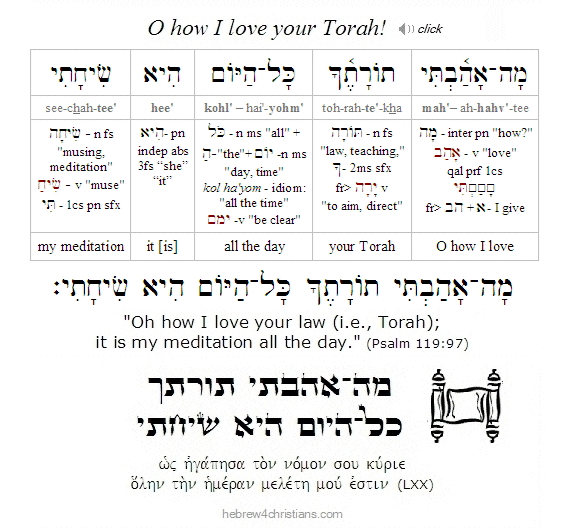 |
The Sigh of Faith...
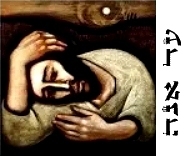
"The now that passes produces time; the now that remains produces eternity." - Boethius
12.06.24 (Kislev 5, 5785) "We groan inwardly as we eagerly await our redemption..." (Rom. 8:23). We sigh deeply because we are suspended between two worlds, living in the ambiguity of an already-not-yet expectation, enduring ourselves as imperfect vessels longing for perfection, trapped between what is and what will be, seeing the unseen, yearning for healing, believing that we shall never die, even as we die (John 11:26). We are restless for our eternal home and long for God's presence as we walk through shadowy vales, facing various temptations, whispering our prayers in the dark. And though we must learn endurance and trust in God's sovereign purposes, our faith nevertheless compels us to cry out, "How long, O Lord?" and "Come, Lord Yeshua" (Rev. 22:20). Our challenge is to keep a positive attitude despite the struggles we face, and therefore we inwardly pray: "Renew within me ruach nachon (רוּחַ נָכוֹן) - "a spirit that says Yes" (Psalm 51:10).
Hebrew Lesson
Psalm 51:10 Hebrew reading:
Surrender means accepting God's will for our lives -- saying "yes" to his promise of love, even if we presently feel empty inside and wonder how long we can hang in there... Saying "yes" implies saying "no" to other things - no to fear, anger and doubt, for example. Tragically there are people who have given up hope for bitterness and despair. Asking the Lord to give us a spirit of "yes" is really a prayer for focus, direction, and the willingness to keep pressing on to our heavenly destiny, especially when the way seems dark and hope seems distant.
Though life is a struggle, we do not lose heart or faint, since even though the outer self is wasting away, our inner self is being renewed (i.e., ἀνακαινόω, "raised up") day by day. "For this light momentary affliction is preparing for us an eternal weight of glory beyond all comparison, as we look not to the things that are seen but to the things that are unseen. For the things that are seen are transient, but the things that are unseen are eternal. For we know that if the tent that is our earthly home is destroyed, we have a building from God, a house not made with hands, eternal in the heavens. For in this tent we groan, longing to put on our heavenly dwelling, that is, substance and reality..." (2 Cor. 4:16-5:3). Meanwhile we must endure ourselves, deal with our resistance to mortification, and ask God for the great blessing of keeping us from evil so that we are not consumed by grief....
Hebrew Lesson
1 Chronicles 4:10b Hebrew reading:
Finding Inner Peace...
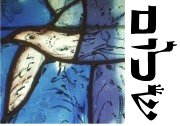
12.06.24 (Kislev 5, 5785) The Hebrew word for peace is shalom (שׁלוֹם), a word that means "wholeness," "completeness," "well-being," and "healing" -- not merely the absence of strife. People often fight with others because they are not made whole within themselves. Just as we cannot really love others until we first learn to love ourselves, so we cannot have peace with others until we first find our own inner healing and peace. Often this means learning to forgive both ourselves and others (including God) so that we can let go of whatever troubles our heart. As we accept ourselves and let go of our fear, we learn to accept others and give up the need to defend ourselves. As Yeshua said, "Blessed (happy) are those who love peace - for they shall be called the children of God" (Matt. 5:9).
אַשְׁרֵי עשֵׂי שָׁלוֹם
כִּי בְּנֵי־אֱלהִים יִקָּרְאוּ

"Blessed are those who love peace,
for they shall be called the children of God."
(Matt. 5:9)
Hebrew Lesson
Matthew 5:9 reading (click):
In most English translations we read, "Blessed are the peacemakers, for they shall be called the children of God." Note, however, that the Greek word translated as "peacemakers" (εἰρηνοποιοί) can also mean "those who love peace," that is, those who long for peace and pursue it (see Psalm 34:14). In Jewish ethical teaching, seeking peace is called redifat shalom (רְדִיפַת שָׁלוֹם) and is considered a primary heart quality. Rabbi Hillel is attributed as saying, "Be of the disciples of Aaron, loving peace and pursuing peace" (Pirke Avot 1:2). Before we can hope to make peace among others, however, we must first know inner peace. If we threaten this peace, we rise up against God, and thereby undermine his will in our lives. Those who love peace will be called the children of God.
Peace is the foundation of God's great work of deliverance in our lives. Yeshua is called Sar Shalom (שַׂר־שָׁלוֹם), the "Prince of Peace" (Isa. 9:6), since salvation brings reconciliation (i.e., peace) between God and man (Rom. 5:1) and sets us free from the fear of condemnation. When we walk in the peace of God (שְׁלוֹם הָאֱלהִים) that "surpasses all our understanding," we are empowered to be a blessing to others in your life. "The fruit of righteousness is sown in peace by those who make peace" (James 3:18).
We understand the Torah commandment, "Thou shalt not steal" (לא תִּגְנב) to imply more than being forbidden to steal from others, but also to include the prohibition against stealing from ourselves by failing to practice inner honesty. When we lie to ourselves, we "steal" from the truth, we rationalize what is unjust, and we thereby rob from ourselves the great blessing of inner peace. Indeed, the traditional sages say that every sin essentially constitutes theft from God. For instance, in his discussion of teshuvah (repentance), Maimonides notes that confession of sin is connected with theft (Num. 5:7). Rabbi Yitzchak of Gur asks, "Inasmuch as there are 365 prohibitions in Torah, why does Torah choose to specify the need to confess sin in regard to theft?" He goes on to answer by explaining that if someone borrows something for a specific use, he is not permitted to use it for any other purpose other than that specified, lest he abuse the privilege and "steal the use" of the item. Likewise, God lends the soul the ability to speak, hear, see, and so on, for the sake of living a godly life. If we abuse these things, for example, by using our lips and tongue to speak evil about another, we are using our faculties for a purpose other than God intended, and that constitutes theft. Therefore every sin is a form of theft, an act of "breaking faith with the LORD," and that is why Torah mentions confession of sin in connection with it.
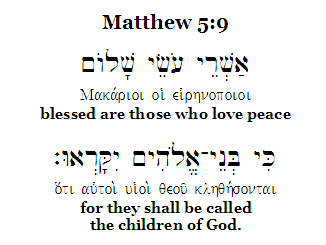 |
 |
The Ladder to Heaven...
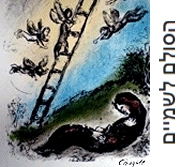
Our Torah reading this week (Vayetzei) includes the famous vision of Jacob wherein he saw the angels of God ascending and descending a ladder that reached from earth toward heaven.
12.05.24 (Kislev 4, 5785) Recall that after Jacob had received the (second) blessing from his father Isaac, he fled for his life to escape the wrath of his brother Esau. He then came upon a certain place (וַיִּפְגַּע בַּמָּקוֹם) and stayed there for the night because the sun had set. Jacob then "took one of the stones of the place, and put it under his head, and lay down in that place to sleep" (Gen. 28:11). And so began Jacob's journey from his homeland to attain the promise of God, and such is the way for us as well, as we first receive our Father's blessing but soon are consigned to desolate places to await things yet unseen. For the way of blessing comes not from the "fatness of the earth" but from the more rarefied "dew from heaven," which descends in mystery, after the sun has set (Gen. 27:28, cp. Gen. 27:39).
The faithful "descend in order to ascend," which means they first suffer and then they are glorified. This is the pattern of Yeshua, who emptied himself and suffered before he was raised up in everlasting glory. "Unless a seed of wheat falls into the earth and dies, it remains alone; but if it dies, it bears much fruit" (John 12:24; 1 Cor. 15:36). God humbles and tests those whom he loves so they may learn to trust in his promise - his word - and to demonstrate his faithfulness in the end (Deut. 8:3; Rom. 11:36).
Note, then, that after being driven from his homeland Jacob dreamed of the ladder with the angels ascending and descending as the LORD himself announced his blessing over his seed (Gen. 28:12-14). Yeshua, as we learn from the gospel (John 1:51) explained that the vision ultimately referred to him - about how the angels followed him during his ascent and descent as the ladder or "bridge" between God and man. The descent refers to Yeshua's incarnation wherein he entered the realm of this world, clothed in human flesh as the Promised Seed, the "Son of Man" who would restore the lost dominion of Adam; whereas the ascent refers to Yeshua's resurrection - the redemption and return of fallen humanity by means of ascension and glorification as LORD over all. Luther understands the angelic host descending and ascending to reveal how the angels love and follow after their Lord -- whose face they do always behold -- eager to behold His advent as our Savior and Redeemer (see Matt. 18:10; 1 Pet. 1:12; 1 Tim. 3:16). Yeshua is Emanuel (עמנו אל), the Heralded Seed through whom all the families of the earth be blessed (Luke 2:8-15).
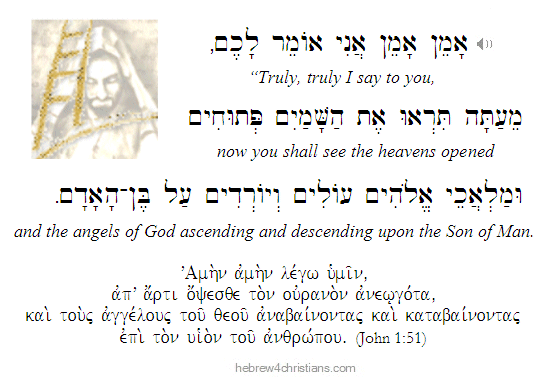 |
Returning to the account of the Torah, after Jacob received this dramatic vision, he awoke from his sleep and exclaimed: "Surely God is in this place, but I did not know!" And he was afraid, and said, "How dreadful is this place! this is none other but the house of God (בֵּית אֱלֹהִים), and this is the gate of heaven" (וְזֶה שַׁעַר הַשָּׁמָיִם, Gen. 28:16-17). Amen, Yeshua is ha'makom (המקום), the appointed "Place" of God, the very "House" of His presence; he alone is the way that leads us back to the Father (John 14:6). Yeshua is the Bridge to the Father, the narrow way of passage that leads to life. He has healed us from the sting of death. He calls out to us in the storm saying, "Take heart. It is I; be not afraid" (Matt. 14:27). Amen.
Hebrew Lesson:
John 14:6 Hebrew reading (click):
Stairway to Heaven....
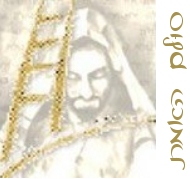
I haven't slept in 24 hours due to serious breathing problems and a bad cough. Please offer a prayer for my recovery.... I don't want to go to the hospital. Thank you friends. - John
12.04.24 (Kislev 3, 5785) The revelation at Sinai and Jacob's vision of the ladder share something in common. Just as Yeshua was the "Voice of the Living God (קוֹל אֱלהִים חַיִּים) speaking (davar) from the midst of the fire" at Sinai (Deut. 5:26), so He was the Ascended LORD standing above the ladder speaking the word of promise (Gen. 28:12-15). In this connection we note that the words for "ladder," (i.e., sullam: סֻלָּם), "voice" (i.e., kol: קל), and "Sinai" (סִינָי) have the same numerical value, which suggests a connection between the two great visions. Yeshua is the Ladder to God, the means by which the Living Torah both descends and ascends for the sake of our deliverance (see John 1:51). The "ladder of Sinai" is not meant for us to ascend but rather is for the LORD our Savior to descend and ascend on our behalf. Yeshua is the way, the truth, and the life (הדֶּרֶךְ וְהָאֱמֶת וְהַחַיִּים): no one can draw near to the Heavenly Father apart from Him (John 14:6).
Hebrew Lesson
Proverbs 30:4 reading (click):
Dealing with the Demonic...

"I feel like crying all the time. I don't want to die, I just don't want to live anymore, if that makes sense. I hate who I am, I can't change it though..." - anonymous teen in a discussion group
12.04.24 (Kislev 3, 5785) Though the Scriptures teach that the realm of the demonic exists, we encounter its presence most usually in thoughts and feelings that entice the soul to act selfishly and to entertain evil imaginations. That is where the battle begins. In the mind. The monster that tempted Eve in the Garden got into her head long before she bit into the fruit from the forbidden tree. And unless we are on guard against the variegated insinuations of godless insanity, we are liable to be under its influence as well...
You might think that demonic oppression is something extraordinary that requires the ministrations of an exorcist, but before any such intervention may be necessary, the mind has been captivated by evil and deranged thinking. Such thinking may have its origins with a demons named "worry," or "shame," or "unworthiness" or "anger." Or they may come from rationalizations or excuses that attempt to console the ego. But a common strategy of the devil is to supply plausible ideas that are designed to deceive us and lead us astray.
Everyone is a theologian of sorts. The difference, however, is whether you are a good theologian or one who is swamped with muddled thinking about what is real. As C.S. Lewis once said, "Good philosophy must exist, if for no other reason, because bad philosophy needs to be answered. The cool intellect must work not only against cool intellect on the other side, but against the muddy heathen mysticisms which deny intellect altogether. Most of all, perhaps we need intimate knowledge of the past."
The devil doesn't care if it is a "holier-than-thou" theology, or a murky mysticism of "absolute tolerance," or a smarmy disavowal of faith in God altogether --- he is equally pleased with the sensualist as well as the atheist, indeed, he is content with any distortion of the truth, for this enables him to "feed" his deluded ego as the "Prince of Darkness." His goal, however, is the same: to devour his victims in darkness and to enslave their hearts in a nightmare...
In a way, dealing with evil thinking is unremarkable. After all, the airwaves of mass media continually disseminate lies, disinformation, and godless thinking in countless formats and by various diabolical stratagems. Whenever we encounter the demonic affecting us, then, we should not panic or be scandalized, but must instead reaffirm the truth of God and resolutely submit to his will (James 4:7). Sometimes this means contradicting the lie by quoting Scripture, offering praise to the Lord, and asking our Heavenly Father for deliverance. In extreme cases, it may be necessary to command the evil spirits to silence their blasphemies and to cease their intrusions. If we find ourselves going out of control emotionally, we are giving ground to the devil. The best tactic is to stay calm and re-center our focus on the Lord who is always present. There is shalom - that is, healing, wholeness, and soundness of mind - as we regain awareness of the greatness and the beauty and the glory of our God.
Hebrew Lesson
Psalm 3:3 Hebrew reading (click):
Jacob's Great Awakening...

I've been sick the last few days and appreciate your prayers. Thank you chaverim...
12.03.24 (Kislev 2, 5785) In our Torah portion this week (Vayetzei) we read: "Then Jacob awoke from his sleep and said, akhen yesh Adonai ba'makom ha'zeh, ve'anokhi loh yada'ti: 'Surely the LORD is in this place, but I did not know it'" (Gen. 28:16). Jacob had been asleep but was jarred awake. He found himself in awe, sensing the presence of the gateway to heaven. The sages note the grammar here is emphatic, suggesting that Jacob said: "Surely the LORD is in this place -- but am I (וְאָנכִי)? I do not know! (לא יָדָעְתִּי). Jacob had awakened from his dream to realize that he had been dreaming his life away, living in a fantasy world. God is present in this place – but am I? Have I awakened to be present before God?
All religious reality begins with what biblical religion calls the 'fear of God.' It comes when our existence between birth and death becomes incomprehensible and uncanny, when all security is shattered through the mystery. This is not the relative mystery of that which is inaccessible only to the present state of human knowledge and is hence in principle discoverable. It is the essential mystery, the inscrutableness of which belongs to its very nature... Through this dark gate (which is only a gate and not, as some theologians believe, a dwelling) the believing man steps forth into the everyday which is henceforth hallowed as the place in which he has to live with the mystery. He steps forth directed and assigned to the concrete, contextual situations of his existence. That he henceforth accepts the situation as given him by the Giver is what Biblical religion calls the 'fear of God.' - Martin Buber, Eclipse of God
An honest theology must find a place for mystery, for "seeing through a glass darkly," and for the apprehension of awe and wonder. Philosophy (not science) asks the question: "Why is there something rather than nothing at all?" This is a question regarding the "why" of existence itself, the profusion of life as it surrounds us. Is there a reason for existence, a purpose, a direction, a radical meaning? Faith "sees what is invisible" by experiencing reality as revelation: the mystery of life points beyond itself to God's creative and sustaining presence: "In Him we live and move and have our being" (Acts 17:28; Rom. 1:20). Cut open a seed and what do you see, but "the hidden power that makes the fruit grow toward the sky." Likewise what is most real about us is shrouded in profound mystery. We are finite, our lives are short and bounded by darkness, yet we sense God's Spirit, the hidden power that upholds our souls, and we trust that we will indeed live forever because of God's love. As theologian Paul Tillich wrote: "The question of being is not the question of any specific being, its existence and nature, but it is the question of what it means to be. It is the simplest, most profound, and absolutely inexhaustible question – the question of what it means to say something is. The word "is" hides the riddle of all riddles, the mystery that there is anything at all." Though we might try to explain God by way of logic and doctrine, in the end it is the mystery of "Messiah in you - the hope of glory."
When God said, "Let there be light, and there was light" (Gen. 1:3), He seemed to put on light as a robe of the Divine Majesty and Kingship: He wrapped Himself with radiance as a tallit gadol... Da lifnei mi attah omed (דַּע לִפְנֵי מִי אַתָּה עוֹמֵד) – "Know before whom you stand." The whole earth is lit up with God's glory, and every bush of the field is aflame before us -- if we have eyes to see (Isa. 6:3). May it please the LORD to open our spiritual eyes so that we can behold more of His glory and majesty in this hour... Amen.
Hebrew Lesson
Gen. 28:16b Hebrew Reading:
The Fight for Love...
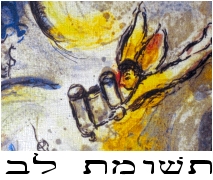
12.02.24 (Kislev 1, 5785) It is written in our Scriptures: "Whatever does not proceed from faith is sin" (Rom. 14:23). This teaches us that sin is not so much disobedience to an external code of behavior as it is abandoning your trust, your identity, and your hope as a beloved child of God. As you believe so you will behave, and as you behave so you believe... Therefore the greatest of sins is to forget the truth of who you really are – a beloved and redeemed child of God! The great temptation of sin is rooted in the lie that we are unworthy people, that God does not really loves us (just the way we are), that He is disappointed in us, and so on. "Self-rejection is the greatest enemy of the spiritual life because it contradicts the sacred voice that calls us the "Beloved." Being the Beloved constitutes the core truth of our existence" (Nouwen). Forgetting who you are leads to forgetting who the Lord is, just as forgetting who the Lord is leads to forgetting who you are.... Therefore the Lord constantly tells us to remember and not to forget the call of his heart, the message of his love.
Sin seduces people to destroy themselves, since it first of all seeks to disown, impugn, and reject what is most important for spiritual life. The devil seeks to murder and destroy all that we need to be eternally healed... And though we might want to escape from this conflict (or to pretend that it's not really here), the battle is intractably real and must be fully engaged until our redemption is complete (1 Pet. 5:8-9). Meanwhile, spiritual struggles can be downright ugly. Would any one deny that the cross of Messiah was a sacred space - and yet it was precisely from there, from the place of blood and suffering and pain and terror, that the grace, beauty, and strength of God for us would shine forth.
To effectively combat the devil, let us first of all pray to the LORD God Almighty and ask for His power, wisdom, and grace to deal with the evil one's devices and strategies used against us (Eph. 6:11-18; Rom. 13:12, 1 Thess. 5:8; 2 Cor. 10:4-5). Since we are not to be ignorant of the devil and his devices (2 Cor. 2:11), let us particularly ask God to remind us of who we really are in the Messiah, and to give us the power of the Holy Spirit to genuine walk in the truth of our sacred identity as his beloved. Let us ask God to help us practically apply the victory given to us in the resurrection of Yeshua. With God's help, may we be bold to take our place at His banqueting table, assured that we are indeed His dear children...
Hebrew Lesson
Proverbs 4:23 reading (click):
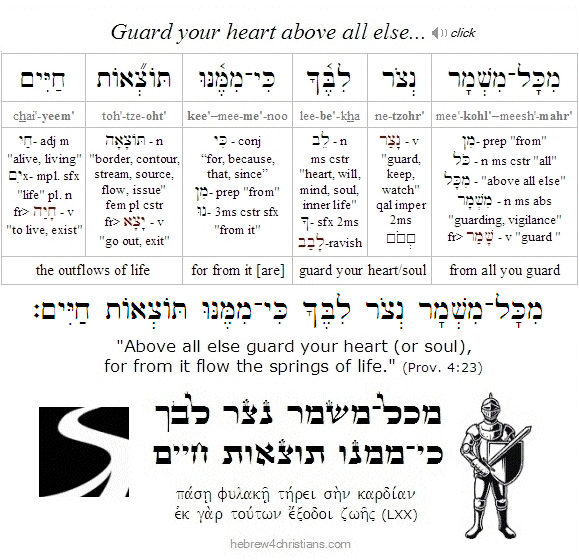 |
His Prevailing Love...
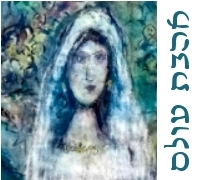
[ The following is related to this week's Torah reading, parashat Vayetzei... ]
12.02.24 (Kislev 1, 5785) Recall that when Isaac "was old and his eyes were dimmed from seeing," he thought to bless his son Esau as the family heir before he died (Gen. 27:1-4). When Rebekah learned of his intention, however, she decided to take matters into her own hands by tricking her husband into conferring the blessing upon his son Jacob instead of Esau. Rebekah likely felt justified in her actions; indeed, had not the LORD himself proclaimed that "the elder would serve the younger" before the twins were born (Gen. 25:23)?
Regarding his role in Rebekah's scheme, Jacob was left with a terrible dilemma: Either he had to defy his mother or to deceive his father. To complicate matters, Rebekah realized that Isaac would discover the charade after the fact, though she may have reasoned that her ruse exposed his gullibility regarding the choice of Esau to be the chosen heir. It was not a real deception, then, but an object lesson for Isaac to wake up before it was too late! Rebekah's plan was to "open the eyes" of her blind husband, revealing to him that he had been guilty of sacrificing the righteous son Jacob for the sake of deceptive Esau.
The duplicity proved to be tragic, however, for everyone involved. Jacob desperately wanted the blessing of his father, but he agreed to get it through false pretenses. "Come close and kiss me my son..." (Gen. 27:26). This was Jacob's deep desire, and yet after "grappling" the blessing from his father he ironically lost his father's embrace. Indeed, Jacob lost not only his father's embrace, but his mother's as well (after fleeing to Haran, Jacob never saw his mother again). Moreover, Jacob's pathetic attempt to "be Esau" severed any hope of a relationship with his twin brother, who afterwards regarded him as his sworn enemy...
So it all went down: Isaac "conferred" the blessing to Jacob, and Esau was understandably enraged over his brother's (and his mother's) rejection of him as the chosen heir of the godly family and steward of the divine promise given to Abraham. When she overheard Esau's plan to exact revenge for his betrayal, however, Rebekah devised the idea to send Jacob to her brother Laban who lived in the city of Haran, some 500 miles northeast of Canaan. To his credit, Isaac finally listened to his wife and reaffirmed the blessing over Jacob (Gen. 28:1-5). And Rebekah's faith in the original prophecy was finally vindicated. Nevertheless, as Jacob fled from his family home in Beersheva, he was confused and uncertain, though God mercifully intervened by giving him the great "vision of the Ladder" and then ratifying the covenant blessing of Abraham and Isaac with him at Bethel (Gen. 28:11-22).
Jacob then continued his journey to Haran. When he finally arrived there, he went to the gathering place of the city well to learn where his uncle Laban (i.e., the grandson of Abraham's brother Nahor) lived and to inquire of his welfare. When the shepherds there told him that Laban was well, they then pointed to a young woman and said "and here comes his daughter Rachel with the sheep" (Gen. 29:6). As a gesture of good will, Jacob then rolled away the stone from the mouth of the well and began watering Rachel's flock. He then excitedly informed her that he was her close relative, her aunt Rebekah's son, who had come from the land of Canaan.
So prophetically and providentially, when Jacob first arrived in Haran he beheld beautiful Rachel who welcomed him in his distress and embodied his hope. It was love at first sight for him. Rachel represented the promise of his blessing to become the patriarch of a multitude of people, and that through his offspring all the families of the earth would be blessed (Gen. 28:14). Because of this, Jacob made haste and soon bartered with his uncle Laban to work seven years for the right to marry his daughter. "So Jacob served seven years for Rachel, but they seemed to him but a few days because of the love he had for her" (Gen. 29:20).
The sages marvel over the perseverance that enabled Jacob to wait seven full years before marrying Rachel, and they ascribe his fortitude to divine grace that made "space shrink and time fly" (Sanhedrin 95b). By this they meant that Jacob's great love overcame the distance of time and space, that is, the sense of the exterior world, something which Jewish philosopher Martin Buber called the world of "It." The world of "It" is objective, outside of you, existing in its own independent modality. The world of "Thou," on the other hand, is that of personal relationship and inwardness, a realm distinct from the world of "It" with its objective categories and relationships. In other words, Jacob's great love made time "stand still" and drew Rachel close to him, despite the passing of years and the distance that separated them. The "math" of this passion made seven years - over 2,500 sunrises and sunsets - seem "as a few days," since the relationship they shared did away with physical and temporal barriers that separated them. Likewise we can endure the "It" of this world and regard it as quickly passing, "as a few days," when we are in loving "I-Thou" relationship with the Lord and with one another. We lose sight of worry, stress, and isolation, and rise above our present circumstances in our communion and in our hope. "For a thousand years in your sight are but as yesterday when it is past, or as a watch in the night" (Psalm 90:4).
When we feel afraid or lonely, the world looms large, threatening, and cold. We feel trapped in its contours and alienated from our own hearts. On the other hand, when we befriend others and engage in honest conversation with them - when "two or three are gathered in My Name" - the miracle occurs and the Lord is present in our midst - timelessly alive, full of welcoming grace, kindness, and love (Matt. 18:20). Moreover, since the Lord is always with us, whenever we sincerely turn to Him we are drawn into his love. As we open our hearts to him, as we engage him in trust, we lose sight of the outer world that confines and defines us, and we find our place in his love and in his blessing. We find our home in Him.
Hebrew Lesson
Jeremiah 31:3b reading (click):
Parashat Vayetzei - וַיֵּצֵא
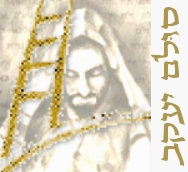
12.01.24 (Cheshvan 30, 5785) Our Torah for this week (i.e., Vayetzei) includes Jacob's dream of a ladder (i.e., sullam: סֻלָּם) extending from earth to heaven, with the angels of God ascending and descending, and the LORD Himself standing above assuring Jacob of his safe return to the land he had fled. Jacob awoke and responded to the dream with awe: "Surely the LORD is in this place (בַּמָּקוֹם הַזֶּה), and I did not know it." And he was afraid and said, "How awesome is this place! This is none other than the house of God, and this is the gate of heaven." And he called the name of that place Bethel (בֵּית־אֵל) i.e., "the house of God."
The sages interpret ha-makom (הַמָּקוֹם), literally "the place" that Jacob saw, as Mount Moriah, the exact location where Jacob's father Isaac was bound as the "sacrificed seed" and which later became the site of the Holy Temple. Indeed the word makom comes from a verb (קוּם) meaning "to arise," suggesting resurrection and ascension. In later Rabbinical thought Ha-Makom became synonymous with the Name or Presence of God Himself ("God is the place of the world, but the world is not God's only place").
Yeshua referred to Jacob's dream when he said, "Truly, truly, I say to you, you will see heaven opened, and the angels of God ascending and descending on the Son of Man" (John 1:51). Just as Jacob saw the ladder ascending to heaven with the angels of God ascending and descending upon it, so Yeshua told Nathanael that He was the Ladder to God, the sha'ar ha-shamayim (שַׁעַר הַשָּׁמָיִם) - the way into heaven (John 14:6). Indeed, Yeshua is the true Place or "house of God" and its Chief Cornerstone (Rosh Pinnah, Matt. 21:42). The LORD is the resurrection and life, the One who prepares a place for you (John 11:25; 14:2).
A Double Blessing for Jacob...
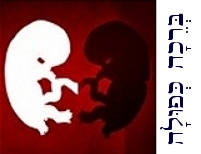
12.01.24 (Kislev 1, 5785) When we think of Jacob as a young man, we tend to recall the dramatic episode when he disguised himself as Esau to "steal" the blessing from his father Isaac. However the Torah tells us that Jacob actually received two blessings from his father. The first blessing was given to a disguised Jacob and it focused on material blessings: the "dew of heaven," the "fatness of the earth," "plenty of grain and wine," political power and hegemony (Gen. 27:28-29), whereas the second blessing was given to an undisguised Jacob and it focused on his role as God's chosen patriarch of the people of Israel (Gen. 28:3-4).
The difference between these blessings turned on Isaac's restored vision. His first blessing was addressed to the character of Esau as his "natural choice," whereas his second blessing looked beyond mere appearances to behold the vision that was originally given to his father Abraham: "Now may El Shaddai bless you, make you fruitful and multiply you so you become an assembly of peoples. And may He grant the blessing of Abraham to you and your offspring" (Gen. 28:3-4).
וְאֵל שַׁדַּי יְבָרֵךְ אתְךָ
וְיַפְרְךָ וְיַרְבֶּךָ וְהָיִיתָ לִקְהַל עַמִּים
וְיִתֶּן־לְךָ אֶת־בִּרְכַּת אַבְרָהָם
לְךָ וּלְזַרְעֲךָ אִתָּךְ
ve·el · Shad·dai · ye·vah·rekh · oht·kha
ve·yaf'·re·kha · ve·yar·be'·kha · ve·ha·yee'·ta · leek·hal · a·meem
ve·yee·ten · le·kha · et · beer·kaht · Av·ra·ham
le·kha · ool·zar·a·kha · ee·takh

"Now may El Shaddai bless you,
make you fruitful and multiply you so you become an assembly of peoples.
And may He grant the blessing of Abraham
to you and your offspring"
(Gen. 28:3-4)
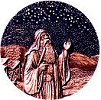
- Isaac's second blessing to Jacob
In a sense, the self-effacing, disciplined, and strong-willed Isaac abandoned his "natural vision" that sought to install Esau as the next patriarch -- despite the objection from his faithful wife Rebekah -- by finally surrendering to the vision of his father Abraham. Isaac's entire life was a sort of overreaction to his father - an "antithesis to Abraham's thesis." By choosing to bless Jacob a second time -- this time with his eyes wide open -- Isaac revealed that he had finally accepted the grace of God that was revealed to his father Abraham.
Recall also that after Esau had discovered that the blessing was given to Jacob, he lamented and pleaded with his father to bestow upon him a blessing as well. It is interesting to note that the "residual" blessing that Isaac gave to Esau was the exact inverse of that given to Jacob: the "fatness of the earth" was put before the "dew of heaven" (compare Gen. 27:39 with Gen. 27:28), indicating that receiving sustenance from heaven is of greater value than finding earthly prosperity.
And indeed, Jacob was "blessed with earthly trouble" his whole life, which caused him to rely on the "dew from heaven," whereas Esau was "blessed" with prosperity (and trouble) that came from trafficking in this world. Regarding Esau it may aptly be said: "Be careful what you wish for -- you just might get it!" (Heb. 12:17).
Hebrew Lesson
Genesis 28:3 reading (click):
Note: Isaac was 60 years old when his two sons were born (Gen. 25:24-26), and according to Jewish tradition, Jacob and Esau were 63 years old at the time of the blessings (Yevamot 6a), making Isaac 123 years old at the time. He later died at the age of 180 (Gen. 35:28-29), making him the longest living of the three patriarchs. The Talmud further states that Jacob first fled to the School of Shem (i.e., Malki-Tzedek) before proceeding to Padan Aram, so that he actually arrived at Laban's home when he was 77 years old.
<< Return
|
|








